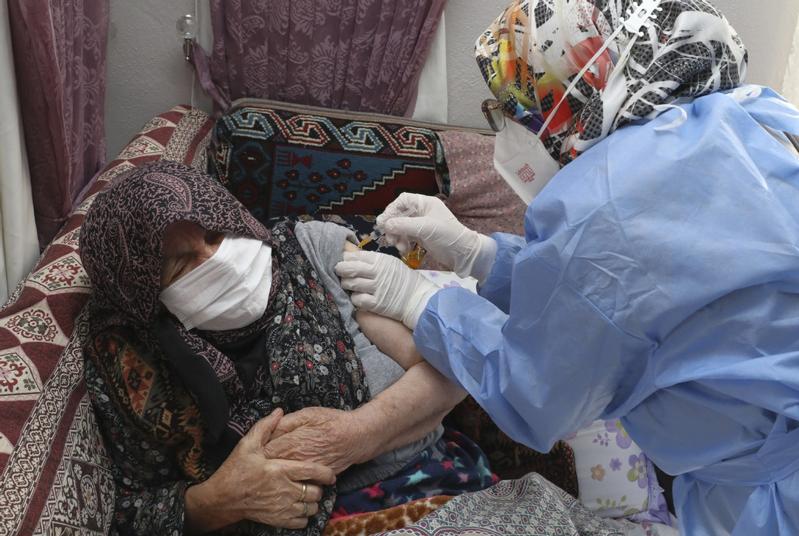
A member of the Turkish Health Ministry's vaccination team administers a dose of the CoronaVac vaccine, produced by China's Sinovac Biotech, to an 89-year-old Turkish woman in Ayas, Ankara province, Turkey, on Thursday. (TURKISH HEALTH MINISTRY / AP)
While Western countries invest enormous capital in developing vaccines to fight the increasing number of confirmed COVID-19 cases, China is fulfilling its promise to make vaccines a global public good.
On Wednesday, the Public Health Institute of Chile approved emergency use of a COVID-19 vaccine developed by Chinese pharmaceutical company Sinovac Biotech.
"This is very important news. ...Millions of doses of this vaccine will allow us to vaccinate many people to try to control the virus," Health Minister Enrique Paris said.
On Tuesday, Serbian Health Minister Zlatibor Loncar was inoculated with Sinopharm's COVID-19 vaccine, becoming the first person in Serbia to receive it.
One million doses of the Sinopharm's vaccine arrived in Serbia and were welcomed at Belgrade Airport by President Aleksandar Vucic.
ALSO READ: China has 5 COVID-19 vaccines in phase III clinical trials
COVID-19 vaccines have the potential to bring the pandemic under control and vaccination is now underway in more than 50 countries, yet all but two of them are high-or upper-middle income countries, according to World Health Organization's Director-General Tedros Adhanom Ghebreyesus.
Only 25 doses have been administered in one lowest-income country, he said, compared with more than 39 million doses in at least 49 higher-income countries.
"Not 25 million, not 25,000, just 25," he said at the opening of the 148th session of WHO's Executive Board, warning of the moral consequences of the lack of COVID-19 vaccines for poorer countries.
Gaps in access to COVID-19 vaccines, especially those between the developed and developing countries, have alerted the international community.
"We must work together as one global family to ensure the urgent and equitable rollout of vaccines," he said on Thursday in an address to the extraordinary meeting of the Strategic Advisory Group of Experts on Immunization.
China's effort
In line with the WHO's advocacy, China has spared no effort to work with the international community to contribute toward equitable distribution and use of COVID-19 vaccines around the world and to help defeat the pandemic.
President Xi Jinping has repeatedly said that Chinese COVID-19 vaccines, once developed and put into use, will be a global public good.
The country has taken concrete steps toward achieving that goal and has vigorously promoted vaccine cooperation with other countries, in particular, offering assistance and support to developing countries, said State Councilor and Foreign Minister Wang Yi.
China, as a participant in the WHO-backed vaccine program COVAX, has been at the forefront of vaccine research and development, upholding the role of multilateral cooperation in advancing the equitable global distribution of vaccines.
China, as a participant in the WHO-backed vaccine program COVAX, has been at the forefront of vaccine research and development, upholding the role of multilateral cooperation in advancing the equitable global distribution of vaccines
The country currently has one vaccine ready for conditional marketing and several others in various stages of clinical trials. Over 40 countries have asked to import Chinese vaccines.
Meanwhile, Chinese companies are also conducting joint vaccine research and development with partners in a dozen countries, trying to make the vaccines more affordable and accessible in developing countries, said Foreign Ministry spokeswomen Hua Chunying.
"For countries that are in urgent need of vaccines, have certified Chinese vaccines, or authorized their emergency use, Chinese companies have started to export vaccines or to discuss relevant cooperation with them, most of which are developing countries," she said.
Global response
The United Arab Emirates, Bahrain, Egypt, Jordan, Turkey, Indonesia, Brazil are among the countries that have authorized the use of Chinese COVID-19 vaccines.
More than 600,000 health workers in Turkey received their first dose, of the two-dose vaccine, in the first two days of the country's mass vaccination campaign, which began on Jan 14.
Indonesia's Food and Drug Control Agency has issued emergency use authorization for Sinovac Biotech's COVID-19 vaccine after interim results of its late-stage trials in the country showed an efficacy rate of 65.3 percent.
Pakistani regulators also approved the Sinopharm vaccine for emergency use on Jan 18. On Thursday, Pakistani Foreign Minister Shah Mehmood Qureshi said that China has agreed to provide half a million doses of Sinopharm's vaccine free of cost to Pakistan by January 31.
READ MORE: China to provide free COVID-19 vaccines to residents
Many state leaders-including Turkish President Recep Tayyip Erdogan and Vice-President Fuat Oktay, Seychelles President Wavel Ramkalawan, Indonesian President Joko Widodo, and Bahrain's Crown Prince Salman bin Hamad Al Khalifa-are among the first in their country to receive the Chinese vaccines.
"They are important pillars buttressing China's fight against the pandemic and participation in international vaccine cooperation," Hua said.
Wang Huiyao, president of the Center for China and Globalization, said China has set a good example in ensuring fair distribution of vaccines around the world, and other countries, especially developed ones, have obligations to bear the responsibility of helping the less developed ones.
He suggested a communication platform for all the vaccine manufacturers to share information so that the research and development process can "catch up with the pace of the virus mutation"
"This is a part of globalization and a manifestation of multilateralism, and China is uniting with all parties to build a community of human health," Wang said. "Only when every country in the world is safe can mankind be truly safe."


